Challenge accepting: where science to lead industry on the threshold of tech revolution of 21st century
Milmax Science Popularisation Festival has taken place in Kazan, organised with the support of Kazanorgsintez PJSC and the Rashid Rameev IT Park
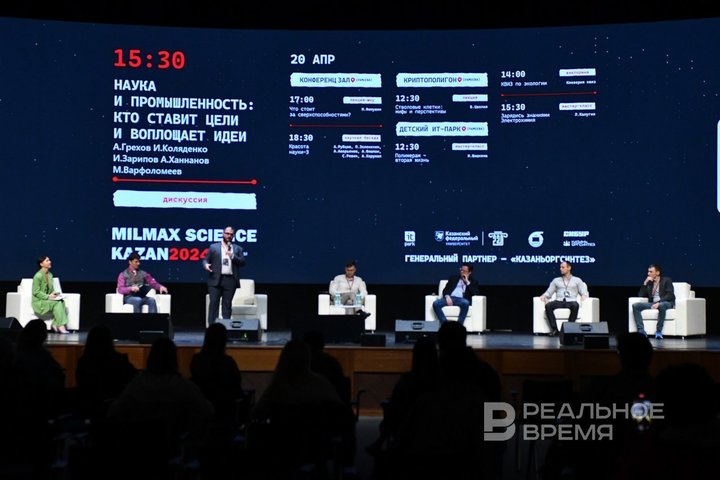
“The technological breakthrough of the 21st century was the development of the iPhone smartphone, but the digital technologies embedded in it were discovered 20 years ago, and Samsung's advanced screens are completely based on the developments of the 1930s. A real scientist looks in two planes — looks into the future and solves applied problems," Mikhail Varfolomeev, the head of the Department of Development and Exploitation of Deposits of Hard-to-reach Recoverable Hydrocarbons of the Kazan Federal University, told about the evolution of scientific thought at the Milmax Science festival. Now the world is on the verge of the technological revolution 4.0: new materials are going to change the face of technology, biomedical technologies — the quality of human life and their abilities. The participants of the Milmax Science festival are sure that a global challenge can be accepted when science goes hand in hand with industry.
“There is chemistry between us”
Scientific discoveries turn the life of society upside down, and the one who is the first to introduce advanced developments finds themselves among the leaders of the world economy. On the threshold of the technological revolution of the 21st century, the domestic industry relies on the achievements of the Russian scientific school, and specifically, Tatarstan, as a major centre of oil production and petrochemistry of the country, is aimed at a breakthrough in the creation of new materials and technologies. “Chemistry between us” is just about science and industry. But who sets goals and implements ideas? What motivates scientists who devote almost their entire lives to scientific research? How to find a balance between academic science and the applied goals of industrialists? The discussion on this topic took place at the panel session of the Milmax Science festival for the popularisation of science, organised with the support of Kazanorgsintez PJSC and the Rashid Rameev IT Park.
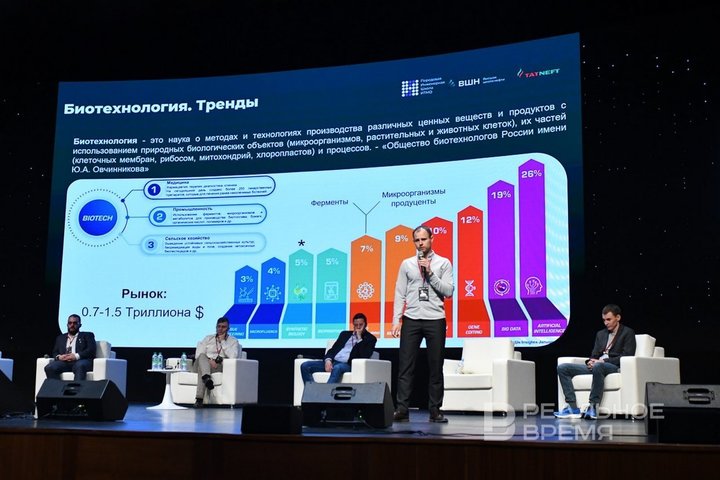
Is the era of polymers here?
Much of what surrounds us is made of polymers. Eight out of ten items that people use are polymer products. Clothes, dishes and even appliances — in almost every car, up to 300 kg of components are made of polymers, said Ilnaz Zaripov, the head of the product and technological development service, director of SIBUR-innovations. Hence, they often like to repeat that the era of polymers has come. “But that's not true," he denied.
The era of polymers came much earlier — from the moment of the appearance of life on Earth itself. According to Ilnaz Zaripov, human himself and the world around him consist of many biopolymers that are constantly transformed. The technological revolution occurred after the start of industrial oil production in the country and the subsequent processing of associated petroleum products. The new era has begun in the world — of synthetic polymers. SIBUR, as a global manufacturer, uses new technologies and digital solutions in production, ensuring environmental safety.
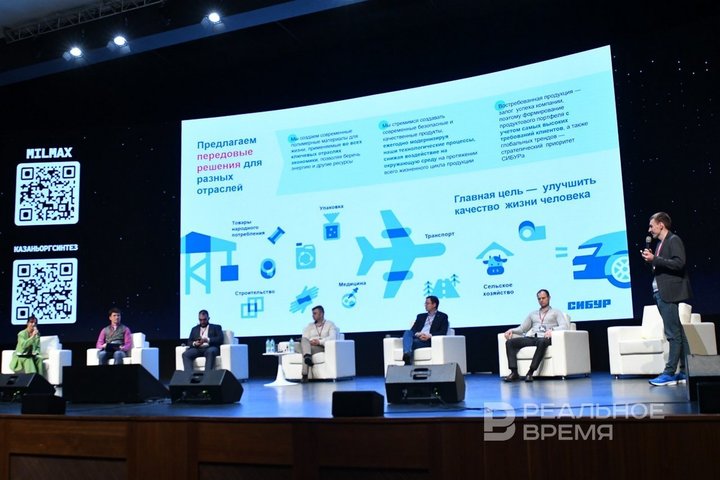
“Previously, associated petroleum products were burned on torches in Western Siberia. SIBUR began to collect and process gas condensate into useful products, expanding the range of polymer products. Now, even in a car, on average, it is up to 300 kg of polymer materials," he noted. According to him, the connection with Kazan is no coincidence: Kazan has a developed chemical school, and SIBUR has become a follower of the scientific traditions of the great scientist Alexander Butlerov: “Today, Kazanorgsintez produces unique products that are not available in the country. These are savylene, polypropylene, and polycarbonates, which are used from the automotive industry to the packaging industry.”
The era of synthetic polymers does not threaten humans: “Used materials can be involved in recycling, and much is being done for this," Ilnaz Zaripov said.
Will Russia run out of oil soon?
Chemistry is unlikely to be able to provide a comfortable life without the main resource — oil. For several years now, there have been dire predictions that the extraction of hydrocarbons in Russia will cease in the coming years, and the world will switch to shale technologies. Mikhail Varfolomeev, the head of the Department of Development and Exploitation of Hard-to-recover Hydrocarbon Deposits at the KFU, said that the rumors are greatly exaggerated. But it has become more difficult and expensive to extract oil.
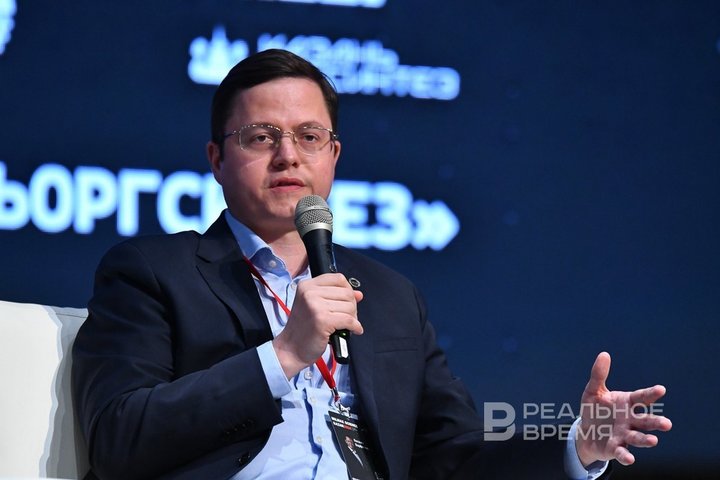
“Russia produces more than 500 million tons of oil a year and 670 billion cubic meters of gas. New technologies are needed to support such production volumes. The era of light oil is coming to an end — you can't just extract and process it. It is necessary to extract hard-to-reach oil more efficiently, from the point of view of economics and environment," the scientist noted.
A world-class scientific centre has been established on the basis of the KFU, which deals with the problems of rational development of liquid hydrocarbons of the planet: “They work to create new reagents that help extract oil from deep deposits. We need hundreds of thousands of tons of chemical reagents, which are used for oil and gas reagents. Most of them are imported from abroad, and here we have to solve the problems of import substitution," Varfolomeev said, adding that there are noticeable successes, and technologies are coming to the real sector of the economy and help to live better.
Saving the world from incurable diseases
The Chemical School of KFU has taken on a mission to save humanity from serious diseases. Candidate of Chemical Sciences, Associate Professor of the Butlerov Chemical Institute at the KFU, Artur Khannanov, said that new medicines are currently being developed: “Saving the world is a romantic part of the work. But, on the other hand, it is necessary to modify polymers with new properties. The job of a chemical scientist is to find a balance by responding to the demands of society," he shared.
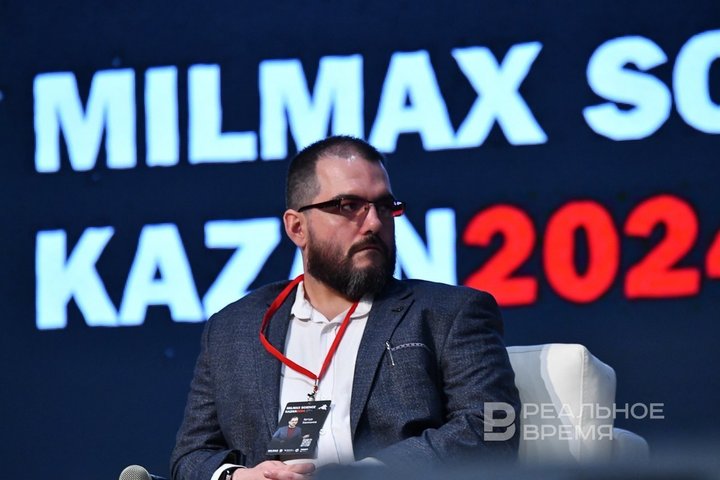
“Green” energy is being developed by Rosatom State Corporation, which has competencies throughout the entire chain of the nuclear cycle. “Nuclear generation is recognised as a green activity, and the European Union has included it in the green topology, putting it on a par with wind, sun and water," said Anton Grekhov, a leading information security engineer at Rosatom State Corporation (Nizhny Novgorod). He recalled that Russian President Vladimir Putin has set the task of making a technological breakthrough in the country, which cannot be done without fundamental science.
How are brilliant ideas born?
Now the world is on the threshold of the technological revolution 4.0, and a breakthrough is expected in the field of new materials, artificial intelligence, quantum computing and biomedical technologies. The global economy has long moved away from workshops, shops, when the secrets of the product were passed down from generation to generation. How is the interaction between science and industry built? Are they ready to take on the challenge?
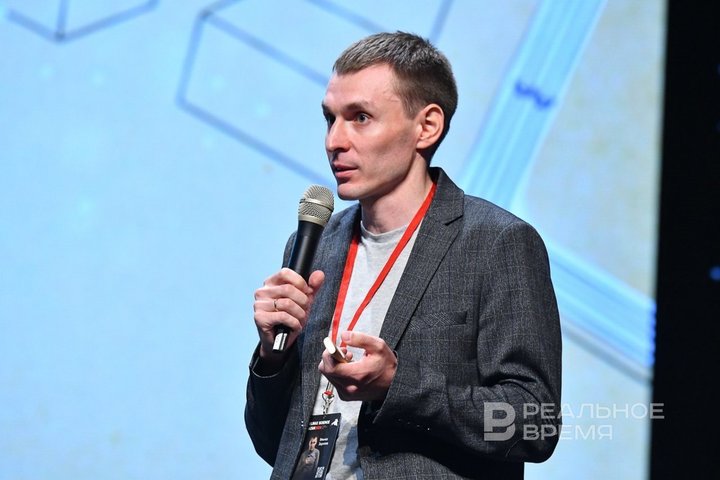
Ilnaz Zaripov, the head of the product and technological development service, director of SIBUR-innovations, believes that cooperation should be based on partnership: the enterprise forms the task, and science offers a solution, and the output should be a competitive market product. “Sometimes we are told: make a polymer that is as strong as steel. We can attract academic science and technology partners. It is possible to make a polymer that is 100 times stronger than steel, but also a million times more expensive than steel. Who will ever use it?" he argues.
The request for new ideas is ultimately formed by the consumer: “Where do the ideas come from? On the one hand, there are customers who consume products, and most of the ideas come from there. We decide how to improve the properties of the products. On the other hand, there is a pool of scientific partners. Our task here is to implement developments in industry," the speaker said.
How to find a balance between academic science and applied goals?
The master of one of the Kazan universities from the audience asked how to develop fundamental science if scientists are aimed at achieving practical results?
The fundamental research programme remains an important task of the country and is supported by state funds, said Mikhail Varfolomeev, the head of the Department of Development and Exploitation of Hard-to-recover Hydrocarbons at the KFU and a member of the Presidential Council for Science and Education: “In fact, the number of grants and competitions to support fundamental science is no less," he said. “The program of the Russian Science Foundation has been implemented for several years, where there are blocks for young scientists.”
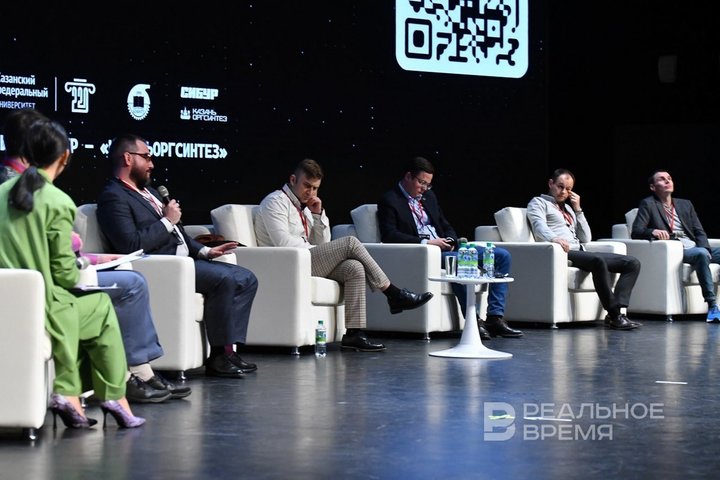
Besides, a program of scientific laboratories for young people has operated in the country for the last two or three years. The main goal is to create promising research teams that begin to pave new directions in science, and this is the beginning of fundamental science. This year, a new programme for graduate students has appeared, it was announced by Vladimir Putin. There will be several hundred scholarships up to 75 thousand rubles. “But it is important that there are not only research as such, but a chain from the idea to the final result. It can be long or short, but the state is now building a pool of programmes that allow scientists to follow this path and implement developments," Varfolomeev assured.
Fundamental science should not remain on the periphery: “We must not forget that everything we have in society now is based on fundamental scientific research of the past. It was then that discoveries were made in quantum technologies, in the development of neural networks. The technological breakthrough of the 21st century was the development of the iPhone smartphone, but the digital technologies embedded in it were discovered 20 years ago, and Samsung's advanced screens are completely based on the developments of the 1930s. A real scientist looks at two planes — looks into the future and solves applied problems," he concluded.